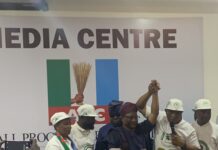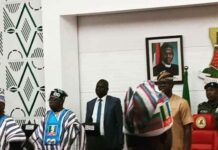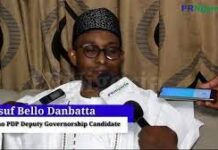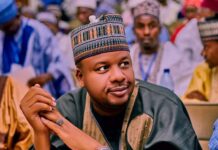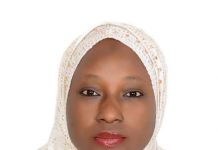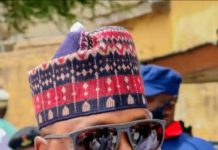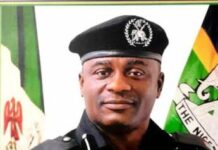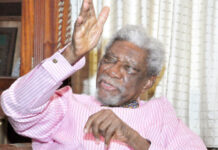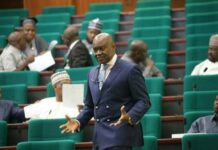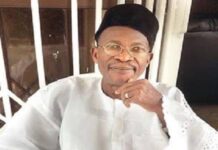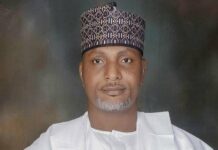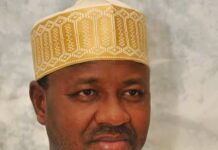Edo, Ondo 2020: We Lack Constitutional Power To Postpone Elections – Okoye
POLITICS DIGEST – Festus Okoye is a National Commissioner with the Independent National Electoral Commission (INEC). He is also the Chairman, Committee on Information and Voter Education at the Commission. In this interview with Authority, he responded to questions on the fate of the governorship elections in Edo and Ondo states amid the COVID-19 pandemic and other issues of interest. Excerpts:
The COVID-19 pandemic is still here and new cases are still being discovered. With the governorship elections in Edo and Ondo fixed for September 19 and October 10 respectively, is INEC contemplating postponing these two elections?
The Edo and Ondo governorship elections are constitutionally circumscribed. In other words, Section 178, subsection 1 and 2 of the 1999 constitution of the Federal Republic of Nigeria (as amended) and Section 25, sub section 7 and 8 of the Electoral Act (as amended) have provided clearly the time window within which these two elections must be concluded. It said that both elections must be conducted not earlier than 150 days before the expiration of the tenure of the last holder of the office and not earlier than 30 days before his tenure expires.
So, the implication is that there is a time frame within which the Commission must conduct both elections and this time frame is what we call a constitutional timeframe. The Commission cannot change the timeframe; the Commission cannot move the timeframe.
Now, if you look at the Edo governorship election, the tenure of the holder of the office will expire on the 11th of November. The implication is that for whatever reasons, the Commission must conduct the governorship election in Edo state on or before the 13th of October 2020. We cannot conduct that election on the 14th day of October 2020 because if we do that, we are falling out of the constitutional window. The constitution says we can conduct the election in June, July, August, we can also conduct it in September; that is the constitutional window within which we can manouvre. Now, we have fixed the Edo election for September 19 2020. Constitutionally, we can decide to move the election forward by one week, we can decide to move it forward by two weeks, we can also decide to move it forward by three weeks so long as we do not cross over the 13th day of October 2020.
Read Also:
Why we normally conduct this election earlier is because for you to be elected as a governor of a state, you must score the majority of lawful vote cast in that election; you must also score a quarter of the votes cast in two- thirds of all the local government areas. If no candidate meets this constitutional provision, the constitution empowers INEC to conduct a second election which must be done within a period of 21 days, which some people call bye-election. So, we normally leave this gap to enable us to conduct that second election should in case anything happens within that 21 days. But the one the constitution says must be conducted within 13th day of October is that first election. But now, given the current challenges in the polity especially the COVID-19 pandemic, by the 14th day of May, we are going to roll out modalities for engagement with civil society groups, political parties, media, security agencies and others. If we start that engagement and there is a need to retouch the timetable and schedule of activities by maybe a week, two weeks or three weeks. That is within our power. But postponing the election is completely outside the purview and outside the power of INEC. The Commission does not have the power, the mandate and the constitutional right to postpone both elections.
What if something happens and INEC cannot conduct the election, may be in a case of war, some Nigerians have alleged that both the governor and deputy will leave and the Speaker will take over pending when the election is conducted. How true is that claim?
If something happens and we are unable to conduct that election, then there are two provisions that are applicable. That is Section 180, sub-section 3 of the constitution and also Section 305 of the constitution. Section 180, sub-section 3 of the constitution says that if the federation is at war in which the territory of Nigeria is physically involved and the President considers that it is not practicable to hold elections, the National Assembly may by resolution extend the period of four years mentioned in sub-section 2 of this section from time-to-time. Such extension shall not exceed a period of six months at any one time. So, if something happens and INEC is unable to conduct election, the Presidency and the National Assembly can utilise the provisions of Section 180, sub-section 3 and declare COVID-19 pandemic as war in which the territory of Nigeria has been physically attacked by an unseen enemy. That is one. If they don’t want to go in that direction, they can now go to Section 305 of the constitution which gives the President of the Federal Republic of Nigeria the right to declare a state of emergency in a state; and then through a proclamation, he can shift the conduct of that election by maybe a period of six months.
These two provisions, that is Section 180, sub-section 3 of the constitution and also Section 305 of the constitution has nothing to do with INEC. The one that has to do with the commission is the one we are doing as at now and we are determined to conduct these two elections within the constitutional mandate given to us. But that constitutional mandate is also subject to the prevailing challenges in the country which may impact on the conduct of these elections. But we are working out modalities, processes and procedures that will enable us to conduct these elections so that we don’t get into a constitutional logjam.
There is the issue of unclaimed voters cards which INEC promised to distribute after the 2019 general elections. When can Nigerians go to INEC office to get their voters cards?
The commission has not taken a position on that. But given the challenges in the country now, I’m not too sure that the issue of unclaimed voters’ cards is on the table for now. Our attention is on how to conduct the elections in Edo and Ondo states with minimal interaction. So, our main focus now is one, how to guarantee social distancing in the polling units in both states given the COVID-19 pandemic. Two, how to prepare our presiding officers for these two elections; Three, how to assist political parties conduct rancour-free party primaries given the challenge of social distancing in the midst of the COVID-19 pandemic that is in the country. How to assist civil society organisations and the media to use non-contact virtual means for purposes of accreditation of each observer and journalists that will be involved in these two elections. So, we are looking at recalibrating the polling units and also redesigning the way things are done in terms of conducting an election in an emergency situation or one that is novel, which has not been experienced before. We don’t have anything to fall back on in relation to this. So, we are just putting in place things that we believe will work in the present circumstances.
Source: The Authority






